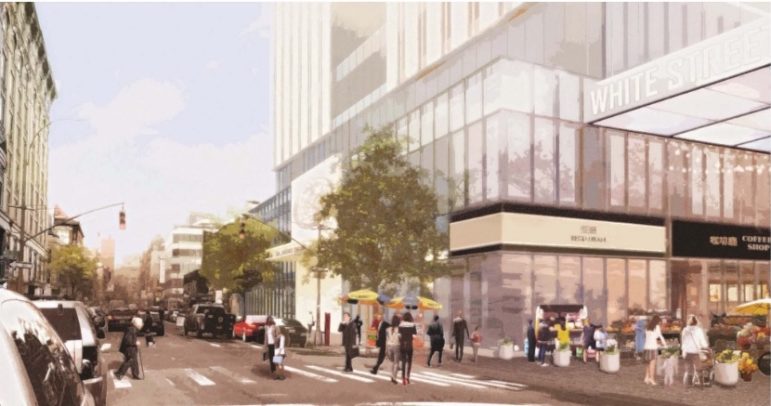
Mayor’s Office of Criminal Justice Services
A rendering of the planned new Manhattan jail.Read the original story in Chinese at Sing Tao Daily
Translated by Rong Xiaoqing
Some Chinatown residents celebrated this month after the newly announced budget for Fiscal Year 2021 included the postponement of funding for the city’s borough-based jail project.
The new budget was based on the city’s reduced revenue and increased expenses on medical services, virus and hunger prevention during the COVID 19 pandemic. Members of Neighbors United Below Canal (NUBC), a residents organization in Chinatown that has filed a lawsuit against the city’s borough-based jail plan, called the postponement a preliminary victory for the community, and says they’ll keep working until the new jails plan is shelved completely.
The $89 billion budget agreement for the new fiscal year, which the mayor and the city council reached on June 30, stated that the budget this year for the borough-based jails was cut for $472 million due to the impact of the pandemic, and the plan is being postponed to the 2025-2029 capital budget instead.
This means Mayor de Blasio’s original timeline to start closing Rikers Island by 2021, the last year of his term, and moving detainees to four new borough-based jails by 2026, may not be met.
Jan Lee, a founder of the NUBC, said residents of Chinatown have held many protests since the city announced the borough-based jail plan, arguing it’s an irresponsible waste of taxpayers’ money.
Lee noted this funding postponement is only the first step toward what they hope will eventually be a final victory in entirely thwarting the city’s plan to build one of the new jails on White Street in Chinatown. The city hasn’t abandoned that plan, meaning organizers have to keep being alert.
Residents in Manhattan’s Chinatown, Kew Gardens in Queens and in the South Bronx, where the new jails would be located, have filed lawsuits against the city. Lee said the NUBC still needs to invest in the long-term battle against the new jails, and push the city to adopt alternative plans to correct the city’s criminal justice system.
Christopher Marte, another co-founder of NUBC, said that while the timing shift is a small victory, the next mayor could still allocate funding to build the borough-based jails. The community needs to watch closely and keep their lawsuits going.
“This fight is long from being over, and the lawsuit is the only way to completely stop the borough-based jail plan,” said Marte. “We call for the residents to keep supporting and donating to the legal battle.”
But Jonathan Lippman, former Chief Judge of New York State who led the New York City Council’s Independent Commission on New York City Criminal Justice and Incarceration Reform, wrote a letter to the mayor right before the budget agreement was reached and called on him to allocate money to close Rikers Island. He also asked the city to reduce the costs of the Department of Corrections and fulfill all the promises regarding Rikers Island’s closure that the City Council voted on in October 2019.
Lippman called for the city to resume the plan, the Request For Proposals process and the work of the consulting team. He said this would save funding in the long run, and emphasized that the delay of even a month would leave more New Yorkers — largely people of color — suffering at Rikers Island, and it is unacceptable.
So for the city’s borough-based jail plan, this is a temporary halt, not a permanent rest. And for the community members fighting the plan, there’s still a long way to go.










One thought on “Opponents of New Jail Celebrate Budget Postponement”
The City’s liberals were bent on being the ones to proclaim they shut down notorious Rikers Island and came up with this preposterous plan to dump it in residential areas… in skyscraper jails. It’s even more pathetic that these pre-pandemic designed jails without outdoor areas is still being pushed by the city council and these self-serving corrupt individuals. It’s not about the prisoners. It’s about glory and their ability to land $11+ billion of contracts for their own preferred private contractors. If this happens, NYC is definitely done beyond even pandemic impact.